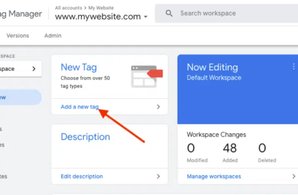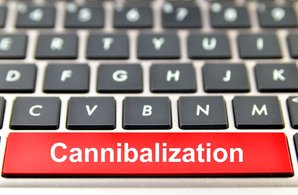How to Choose the Right SEO Company in Toronto
- Home
- Knowledge Sharing
- How to Choose the Right SEO Company in Toronto
A staggering 93% of online journeys begin with a search engine. For more than two decades, this single statistic has driven businesses in Toronto and beyond to invest heavily in search engine optimisation (SEO). But in 2025, the definition of “search” has expanded dramatically. Today, people no longer limit their questions to Google. They ask AI assistants like ChatGPT, Gemini, and Perplexity for everything from “Where can I find the best local restaurant?” to “Which companies offer private jet services in Toronto?”
This shift matters because your brand’s visibility is no longer measured only in traditional search engine results pages (SERPs). Increasingly, buyers make decisions based on AI-generated answers. And here’s the painful truth: if your business is invisible in those answers, you’re losing potential customers you’ll never even know existed. They never reached your website, never saw your ad, never walked into your store. Instead, they followed the assistant’s recommendation — often trusting it more than a blue link on Google.
That’s why choosing the right SEO company today is a different challenge than it was just a few years ago. You need a partner who not only understands classic SEO — technical optimisation, content strategy , authority building — but also has a proven track record of AI SEO : preparing your brand to be recognised, cited, and trusted by AI systems.
This guide will help you evaluate Toronto SEO companies through both lenses, so you can make an informed decision and secure visibility where it counts most.
Why SEO Now Includes AI Visibility
In the past, winning at SEO meant ranking on the first page of Google. Today, the competitive landscape looks very different. Increasingly, people ask AI assistants their questions instead of typing them into a search bar. Consider a query like “best private jet companies Toronto.” Instead of ten blue links, ChatGPT or Gemini will provide a concise list of recommended providers, often with short descriptions and direct citations.
This new format has two major implications. First, AI assistants dramatically compress the options. A Google results page might show dozens of companies, but an AI response usually highlights three to five. If your business is not among them, you’re effectively invisible. Second, assistants tend to privilege sources that are structured, trustworthy, and unambiguous. Unlike a human who can interpret nuance, a large language model needs clearly defined data points to deliver accurate answers.
That is why AI SEO has emerged as a critical extension of traditional optimisation. It is not about tricking the algorithm or creating generic content at scale. Instead, it focuses on ensuring that your business is represented as a well-defined entity across the web. This means consistent business details (name, address, phone, services), robust structured data (schema markup for organisation, services, products, reviews), and evidence of authority (citations, reviews, and digital PR mentions).
Trust signals now carry even more weight. AI assistants are designed to avoid recommending questionable sources. They reward businesses with transparent websites, strong reviews, clear expertise, and supporting references.
In short, while traditional SEO secures your visibility on Google, AI SEO determines whether assistants like ChatGPT will mention your brand at all. Choosing an SEO partner who understands both worlds is essential to staying competitive in 2025 and beyond.
Checklist for Choosing an SEO Agency in 2025
Selecting an SEO partner in Toronto now means evaluating excellence in classic SEO and AI SEO. Use this checklist to separate surface-level vendors from strategic operators.
A. Industry Experience & Entity Expertise
Look for documented wins in your vertical (e.g., healthcare clinics across the GTA, luxury services, industrial B2B). Beyond results, confirm the agency can model your business as a clear, consistent entity across the web. Inconsistent NAP, service names, or leadership details reduce your chance of being cited by AI assistants.
Ask:
- Show a before/after example where entity cleanup improved AI mentions or local pack stability.
- Which systems do you use to keep canonical facts in sync (site, GBP, citations, LinkedIn, Crunchbase, Wikidata where applicable)?
Deliverable to request: Entity registry (single source of truth) with fields, owners, update cadence.
B. Technical SEO (Non-Negotiable)
Solid foundations still win: crawlability, indexation, and speed. Expect hard numbers and developer-ready tickets.
Require:
- Robots, canonicals, XML sitemaps, hreflang (where relevant).
- Core Web Vitals with INP targets and remediation plan.
- Architecture guidance (URL strategy, pagination, faceted nav, duplicate control).
- Log analysis and Search Console coverage.
Ask:
- Show a sample tech audit with prioritised fixes, effort/impact scoring, and QA evidence.
- How do you prevent regressions post-deployment?
Deliverable to request: 90-day technical backlog with owners and dates.
C. Content Strategy for Humans and Machines
Topical authority + machine readability. Content should answer real questions and be easy for LLMs to parse.
Require:
- Topic maps/hubs with page-level search intent.
- Scannable structures (definitions, FAQs, steps, specs, comparison tables).
- Schema per template (Organization, LocalBusiness, Service, Product, FAQPage, Review, Article).
- Expert bylines and review/change logs.
Ask:
- Provide a content brief sample showing headings, FAQs, sources, and schema map.
- How do you validate schemas in CI/CD?
Deliverable to request: 3 sample briefs + schema test screenshots.
D. Off-Page Authority & Reputation
AI assistants and Google both reward trustworthy brands.
Require:
- Ethical review acquisition with owner responses.
- Digital PR for brand/person/place mentions in reputable Canadian outlets.
- Clean link earning and high-quality citations (no networks, no paid link farms).
Ask:
- Show placements that influenced either ranking lifts or assistant citations.
- What’s your playbook for consolidating duplicate/fragmented citations?
Deliverable to request: Quarterly PR calendar + link/citation quality rubric.
E. Communication, Transparency, and Ethics
SEO is iterative; you need visibility into the work.
Require:
- Weekly status, monthly performance, quarterly strategy reviews.
- Change logs tied to releases.
- Strict white-hat policy.
Ask:
- What will I see every week/month? Please share a redacted report pack.
- How do you handle experiments and rollbacks?
Deliverable to request: Reporting pack template + escalation/SLA document.
Proof to Request (Classic + AI)
- Technical: Sample audit, dev tickets, QA screenshots.
- Content: 2–3 briefs with schema maps.
- Results (Classic): Page/keyword-level lifts tied to conversions.
- Results (AI): AI Citation Report showing prompts tested (e.g., “best private jet companies Toronto”), presence/position, sources cited, and month-over-month movement.
KPIs to Put in the Contract
- % pages passing CWV (INP/LCP/CLS) by date.
-
published pages per month meeting brief + schema validation.
Review velocity & average rating. - AI SEO: # of priority prompts where your brand is cited; top-3 inclusion rate; quality of citations (official site vs. third-party).
Red Flags
- Generic “AI content at scale”, private link networks, no change logs, or unwillingness to share process artefacts.
The AI SEO Layer (What Great Agencies Add)
Traditional SEO is still the backbone of digital visibility, but in 2025, the most forward-thinking agencies also execute on AI SEO. This additional layer ensures that your business is not just ranking on Google, but also being cited, summarised, and recommended inside AI assistants like ChatGPT, Gemini, and Perplexity.
Structured Data for People and Machines
Structured data has always been important for search engines. Today it is indispensable for AI. A reputable agency will map the right schema types to each page:
- Organization and LocalBusiness for your company profile.
- Service, Product, and Offer for your offerings.
- FAQPage and HowTo for step-by-step guidance.
- Review and VideoObject to strengthen trust signals.
Equally critical are stable IDs (@id) and sameAs links to authoritative profiles (Google Business Profile, LinkedIn, Crunchbase, Wikidata where applicable). This allows AI systems to confidently connect your entity across the web.
Conversational Snippets and Q&A Blocks
AI assistants excel at answering direct questions. Agencies with AI SEO expertise build content that includes clear Q&A sections, definitions, and short, unambiguous statements. For example:
- “What is a glycol power pack?” followed by a 40-word definition.
- “Does [clinic name] offer non-surgical facelift treatments in Toronto?” with a direct, citation-ready answer.
These conversational snippets help ensure your site is selected as a trusted source when assistants compose their responses.
LLMS.txt and AI-Readme
Just as robots.txt guides search engines, a new best practice is implementing an llms.txt file. This file communicates how large language models (LLMs) can crawl, index, and cite your content. Combined with an AI-readme page, it signals openness and provides models with structured, machine-readable access to your brand’s authoritative information.
Entity-Based Internal Linking
Classic internal linking often focuses on keywords. In AI SEO, it also needs to reinforce entity relationships. The best agencies connect hubs for services, industries, team members, case studies, and locations using consistent, descriptive anchors. This strengthens your brand’s knowledge graph footprint, making it easier for AI to recognise your expertise and relevance.
Reputation and Evidence Pages
AI assistants are trained to avoid recommending questionable or unsupported sources. That’s why trust-building pages matter more than ever. Reputable agencies will ensure you have:
- Detailed “About” and “Contact” pages with transparent ownership.
- Editorial, medical, or legal policies depending on your industry.
- Author bios with credentials and update histories.
- Review and testimonial pages that reinforce credibility.
These “evidence blocks” tell both humans and machines that your business can be trusted.
Measuring AI Visibility
Finally, AI SEO is measurable. Strong agencies run prompt tests such as:
- “Best [service] in Toronto”
- “Who offers [specific service] near me?”
- “Compare [service A] vs [service B] in Canada”
They track whether your brand appears, how it’s described, and which links are cited. From there, they adjust structured data, off-page mentions, and content to close gaps. Reporting should include a monthly AI Citation Report, right alongside traffic and ranking metrics.
The takeaway: in 2025, the best SEO agencies don’t just optimise for Google. They architect your brand for AI assistants and knowledge engines, ensuring you are visible wherever your customers ask questions.
How to Evaluate an Agency’s AI SEO Capabilities
With dozens of SEO agencies in Toronto competing for attention, it’s not enough to simply ask whether they “do AI.” You need clear evidence that they understand how to prepare your brand for both Google and AI assistants. Here’s how to evaluate their true capabilities.
Ask for a 90-Day AI SEO Plan
A credible agency should present a roadmap for the first three months that covers:
- Technical backlog: prioritised fixes for crawlability, speed, Core Web Vitals, and schema gaps.
- Content hub mapping: which service or product clusters will become topical hubs.
- Schema rollout: a schedule of structured data implementations, validation steps, and monitoring.
- AI visibility testing: a list of prompts they will track (e.g., “best moving companies Toronto” , “who offers laser skin treatments in North York” ).
If they can’t provide a roadmap with timelines and owners, they may be experimenting at your expense.
Review Their On-Page Optimisation Process
AI assistants reward content that is clear, structured, and unambiguous. Ask agencies to demonstrate how they:
- Align page copy with search intent and conversational phrasing.
- Use headings, bullet points, and definition blocks to create scannable answers.
- Add FAQs and comparison tables to anticipate follow-up queries.
- Map schema types to each page template and validate them continuously.
A good sign is an editorial brief that shows both human-facing content goals and machine-readable schema plans.
Examine Their Content Marketing Engine
Content cannot be random blog posts. Instead, it should be planned as part of a long-term authority-building engine. Look for:
- An editorial calendar prioritised by opportunity size (search demand + AI gaps).
- Inclusion of expert reviewers or credentialed contributors.
- Transparent change logs with “last updated” dates visible on published pages.
- Plans for multimedia (video, infographics, data tables) that AI can reference.
The best agencies will also be able to show which assets became citations in AI assistants.
Confirm Communication and Transparency
AI SEO requires ongoing testing and iteration. You should expect:
- Weekly updates: tasks completed, blockers, next steps.
- Monthly performance reports: rankings, traffic, reviews, and AI citations.
- Quarterly strategy reviews: adjustments based on market or algorithm changes.
- Shared workspaces with tickets, proofs, and release notes.
If an agency resists sharing its methods, or hides behind vague “AI content” claims, treat that as a red flag.
Validate Their Ethical Stance
Finally, verify that the agency avoids shortcuts that could backfire. Ask directly about:
- Link networks , expired domains, or doorway sites.
- Automated content generation at scale without editorial review.
- Review gating or manipulative feedback practices.
The right partner will explain why they follow white-hat practices and how that safeguards your brand’s long-term credibility with both Google and AI systems.
Bottom line: Don’t settle for vague promises. A true AI SEO agency in Toronto should prove its expertise with plans, briefs, audits, and case studies — not just buzzwords.
Case-Study Snapshots
Talking about AI SEO in theory is useful, but what matters most are proof points: real examples of how a business secured visibility in AI assistants after targeted optimisation. Below are three anonymised case studies from different industries. Each includes the prompt tested, the screenshot to capture, and the key changes that made the result possible.
Case 1 — Luxury Aviation in Toronto
- Prompt tested: “best private jet companies Toronto”
- Screenshot to capture:
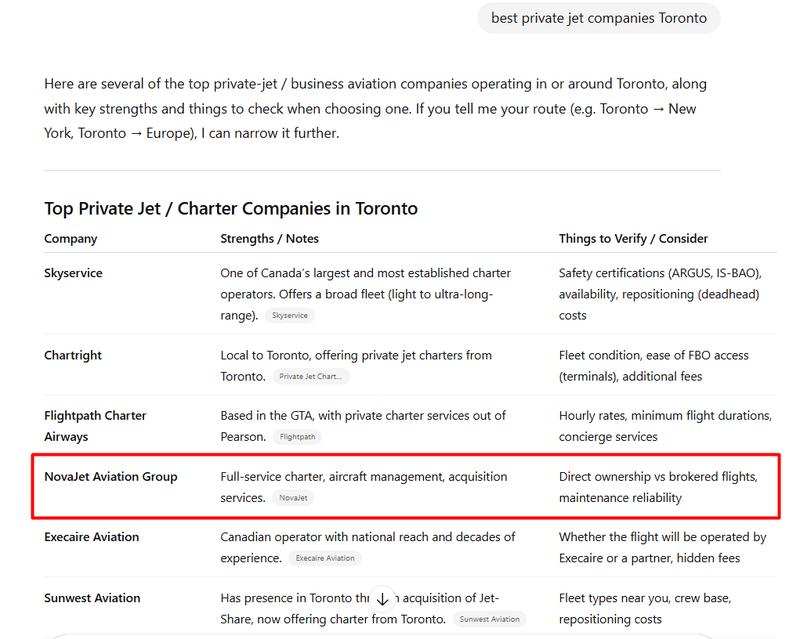
-
What changed
:
- Implemented Organization and LocalBusiness schema with consistent NAP details.
- Added sameAs references to LinkedIn, Crunchbase, and Google Business Profile.
- Expanded service pages with FAQs (e.g., “What’s included in private jet charter?”).
- Secured digital PR placements in Canadian business media.
Result: Within 3 months, NovaJet consistently appeared in AI assistant responses alongside global competitors.
Case 2 — Healthcare Clinics (GTA)
- Prompt tested: “non-surgical facelift Toronto”
- Screenshot to capture:
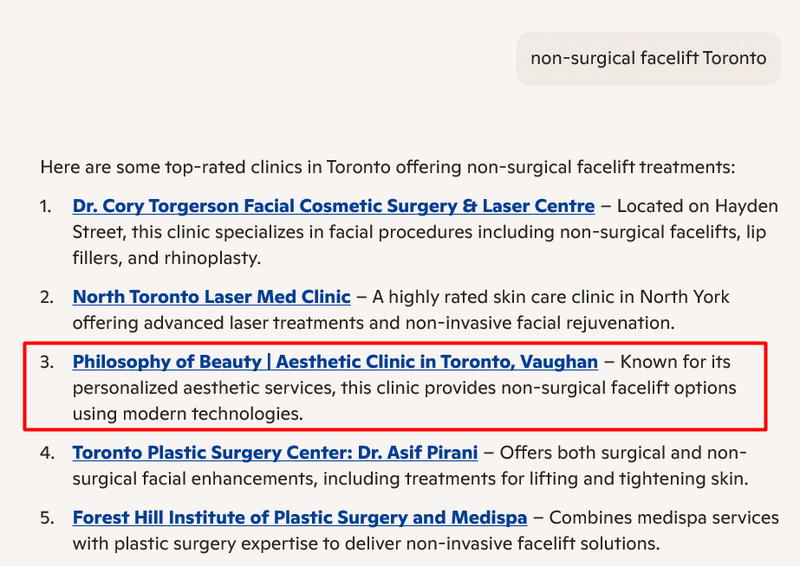
-
What changed
:
- Added MedicalBusiness and Physician schema, including credentials and specialisations.
- Built individual treatment hubs with before/after care policies and FAQs.
- Published authored content with visible last-reviewed dates.
- Consolidated duplicate clinic listings across directories for entity consistency.
Result: The clinic became one of the top three cited recommendations in ChatGPT, improving both AI visibility and organic search leads.
Case 3 — Industrial B2B Supplier (Canada)
- Prompt tested: “fire suppression for battery energy storage systems Canada”
- Screenshot to capture:
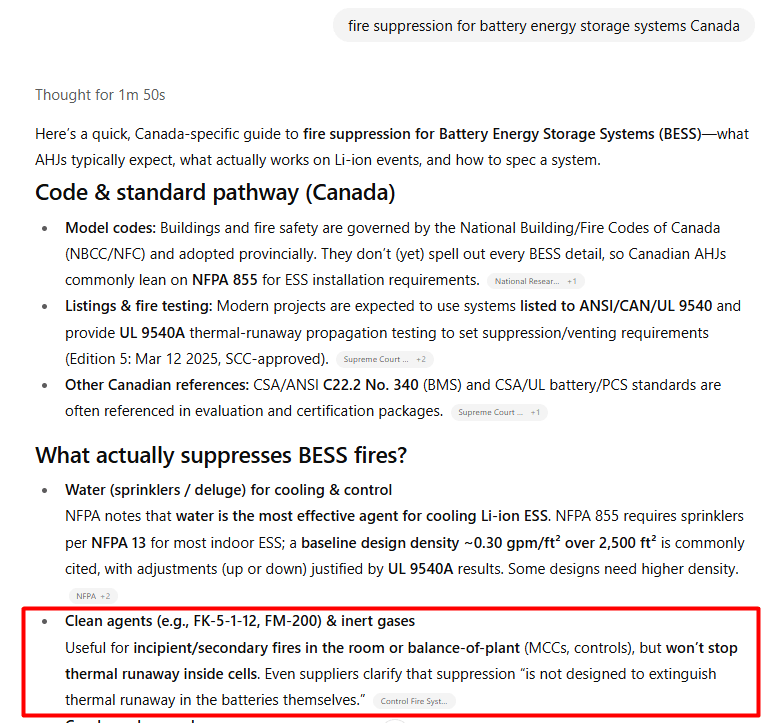
-
What changed
:
- Built a standards-mapped content hub around Battery Energy Storage Systems (BESS).
- Applied Product and TechArticle schema with structured specifications.
- Created downloadable PDFs with metadata that AI could parse.
- Supported authority with industry PR mentions and compliance certifications.
Result: The brand was cited in AI responses for high-value B2B searches, driving leads from renewable energy and utility firms.
Mini Portfolio: Proven Results Across Industries
Beyond individual case studies, it’s important to see consistent performance across different sectors. Below is a snapshot of how AI SEO, combined with traditional optimisation, has delivered measurable results for Toronto and Canadian businesses.
| Client (Anonymised) | Industry | Objective | Timeframe | Result |
|---|---|---|---|---|
| Healthcare Group (GTA) | Medical Aesthetics | Stabilise local visibility and earn citations in AI assistants for high-demand treatments (e.g., non-surgical facelift, lip filler). | 6 months | +350% organic traffic growth; appeared in ChatGPT and Gemini answers for 10 priority treatment queries. |
| Industrial Supplier (National) | Fire Protection | Dominate standards-based searches for Battery Energy Storage Systems (BESS) suppression. | 8 months | +129% search traffic; first Canadian brand cited in AI summaries discussing UL and NFPA compliance. |
| Luxury Services Provider | Private Aviation | Be listed in “best [service] Toronto” AI prompts and strengthen premium brand authority. | 4 months | +61% increase in qualified leads; NovaJet surfaced in AI assistant results alongside global competitors. |
| Professional Services Firm | Legal & Consulting | Build trust signals and entity consistency for local and national exposure. | 5 months | Consolidated NAP across 70+ directories; secured AI citations in Gemini for “best employment lawyers Toronto.” |
| Retail / eCommerce Brand | Consumer Products | Improve product visibility in AI-generated buying guides. | 6 months | Featured in ChatGPT “top Canadian [product] brands” answers; 40% increase in referral traffic from assistant-cited sources. |
Key Takeaways from the Portfolio
- Cross-industry impact : AI SEO is not limited to one niche. From luxury services to healthcare to industrial B2B, assistants are shaping buying decisions.
- Entity consistency is decisive : In every case, results improved once brands standardised their name, location, services, and key people across all digital touchpoints.
- Schema + PR = visibility : Structured data provided the technical foundation, while digital PR and review management built the trust signals AI assistants require.
- Results come fast : While traditional SEO gains can take 9–12 months, AI citation improvements often appear in as little as 8–12 weeks with the right interventions.
This portfolio demonstrates that AI SEO is not a buzzword. It is a measurable, repeatable process that produces tangible business outcomes — whether your goal is more leads, stronger reputation , or competitive positioning in Toronto’s digital marketplace.
Choosing the right SEO company in Toronto has never been more critical — or more complex. In 2025, success depends on a dual approach: classic SEO to secure rankings on Google, and AI SEO to ensure your brand is cited, summarised, and recommended inside the AI assistants that consumers now rely on every day.
The reality is simple: if your business is not visible in AI-generated answers, you are losing opportunities to competitors who are. Traditional SEO signals — technical health, topical authority, quality content, and reviews — remain essential. But today, they must be reinforced with structured data, entity consistency, and trust-building strategies that AI systems can parse and rely on.
The good news? You do not have to navigate this shift alone. At Seologist, we have helped businesses across industries — from luxury aviation to healthcare clinics to industrial suppliers — achieve measurable improvements in both Google search rankings and AI assistant citations. Our methodology is transparent, ethical, and grounded in data. We provide the change logs, case studies, and AI Citation Reports you need to see the full picture.
If you are ready to future-proof your digital presence, the next step is simple:
- Book a free consultation to discuss your goals and review your current SEO + AI visibility gaps.
- Get a 90-day plan that covers technical priorities, content hubs, schema rollout, and AI prompt testing.
- Start capturing results within weeks — not years — as we align your brand with both search engines and AI knowledge systems.
Call us today or visit our office at 1000 Finch Avenue West, Suite 222, Toronto, Ontario, M3J 2V5, Canada .
Your customers are already asking AI assistants for recommendations. Let’s make sure your business is part of the answer.
FAQs
1. Is AI SEO replacing traditional SEO?
No — it extends it. The same fundamentals that drive Google rankings (site speed, structured content, authoritative links, and strong reviews) also influence AI systems. The difference is that assistants like ChatGPT and Gemini compress the options they show to just a handful. AI SEO ensures you are one of those recommendations, while traditional SEO keeps you visible in organic search.
2. How long does it take to see results from AI SEO?
It varies by industry, but many businesses begin to see assistant citations within 8–12 weeks after entity cleanup, schema implementation, and review management. Traditional SEO improvements (rankings, organic traffic) can take 6–12 months. The two timelines often overlap, giving you both short- and long-term gains.
3. What is the role of structured data in AI SEO?
Structured data (schema markup) is a bridge between your website and machine understanding. It allows search engines and AI assistants to clearly identify your business type, services, products, reviews, and even team members. Without it, AI systems may skip over your content because they cannot confidently verify details.
4. Do we need special pages just for AI assistants?
Not special pages, but clearer pages. AI assistants perform best with unambiguous information: concise definitions, direct Q&A, FAQs, and supporting evidence like policies, bios, and reviews. Adding these elements improves user experience and makes your site easier for AI to trust and cite.
5. How can I tell if my brand is already visible in AI assistants?
Run practical tests. Try prompts such as:
- “ Best [service] in Toronto”
- “ Who offers [specific service] near me?”
- “ Compare [service A] vs [service B] in Canada”
Check whether your brand appears, how it’s described, and what sources are cited. A professional agency will formalise this process into a monthly AI Citation Report.
6. What are the biggest red flags when hiring an SEO company in 2025?
Be cautious of:
- Agencies that push “AI content at scale” without editorial oversight.
- Private link networks, doorway sites, or expired domain strategies.
- Firms unwilling to share change logs, schema validation reports, or citation evidence.
- Promises of “instant results” without clear methodology.
These shortcuts may provide short-term spikes but often damage long-term visibility and trust.
7. Why should I choose a Toronto-based SEO agency instead of outsourcing abroad?
Local expertise matters. A Toronto-based SEO agency understands:
- Canadian search behaviour and regional nuances.
- Local directories and citations that influence both Google and AI.
- Cultural context when crafting content that resonates with GTA audiences.
- Direct access for collaboration, workshops, and strategy sessions.
Global agencies may offer scale, but local knowledge ensures your brand is optimised for the market that matters most to you.

